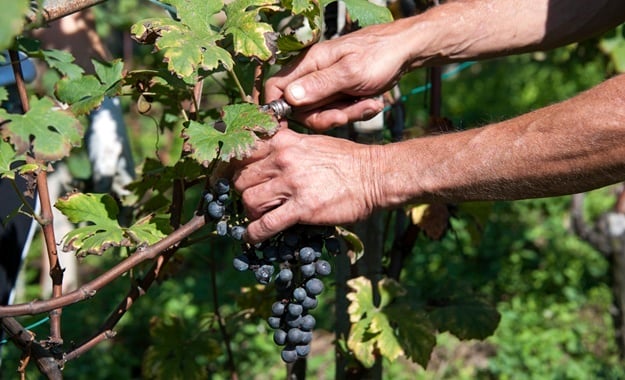
The Cape's three-year drought has taken its toll on the wine industry and early indications are that this year's harvest will be even lower than the poor 2018 harvest.
Anton Smuts, chairperson of Vinpro, a non-profit company representing around 2500 wine producers, said on Wednesday: "It's been a bit of a shock. It is the roll-over effect of the drought. The Worcester area thought they would have a good crop until they started to harvest, and they were down radically. Also Robertson and the Olifants area."
Smuts said the 2019 wine grape harvest had only just begun, and the situation could change in the next few weeks as more areas were harvested, but this was what early indications suggested.
"We didn't think it would be worse than last year - the 2018 harvest was the lowest in 13 years - but it seems it will be. You can see from the weights of the berries. That could be an asset for quality, more flavour, but we will have to see."
He said the prospect of a lower harvest appeared to be the case in all the production areas, except the southern Cape. The Stellenbosch and Paarl areas had got a bit more irrigation water so those harvests should be the same as last year or maybe slightly up.
'It is definitely the drought'
The Bonnievale, Robertson and Klein Karoo areas were also down. "It is definitely the drought."
Smuts said it was too early to put a price on the amount of money the drought had cost wine farmers.
Because of the crippling drought - with no indications of whether it will be broken this winter - the industry was looking at water efficiency techniques.
Vinpro was carrying out tests to establish the minimal amount of water a grape vine needed to survive.
"A big issue for us is water pollution of the rivers. That has got to be eradicated. There is sewage effluent in many rivers and you can't do anything with polluted water. Water is a critical element for humankind. Cleaning up our water is the most important thing, second to job creation."
Smuts said another problem the wine farmers faced was the undercutting of prices by a small number of producers.
Some prices lower than water
He said he had "stepped on some toes" at the Nedbank Vinpro information day in Cape Town last month when he said in his address that some people were selling wine for less than the price of bottled water.
About 14% of South Africa's bulk white wine was sold for less than R4.50 a litre, whereas bottled water was sold for about R5 or R6 a litre.
This had a damaging effect on the international price of South African wine.
"Many people came to thank me for saying that because that price is hopelessly too low, it is just not sustainable. I told them: 'Why not sell water instead?'"
Smuts said South Africa was already selling wine at lower prices than Spain.
"And we are not even near Argentina or France or Chile. It's our own fault because we are inclined to accept a low price. We've got to lift the overseas market.
"The wine writers in the UK and Europe give us very good write-ups about the good quality of South African wines, so we don't need to stand back. If you sell for a lower price, people think it is inferior quality," Smuts said.
Cape Town's dams at 58%
The 2018 wine grape harvest was 1 238 000 tons, which was 14% smaller than that of 2017.
Vinpro's consultation services manager Francois Viljoen said the 2017/18 drought had "forever changed our frame of reference about our water resources and our way of thinking about water.
"We had to come up with new ways to save water and use it more efficiently. In some cases vineyards had to be managed with 50% less water than usual, and in some extreme cases with only 16% of the normal water allocation," Viljoen said.
*The combined level of the six dams that supply Cape Town and surrounds was 58.4% of capacity on Wednesday, down slightly from 60.5% the previous week.
Water consumption in Cape Town crept up to 614 million litres a day last week, still well below the target of 650 million litres a day on level 3 water restrictions.




 Publications
Publications
 Partners
Partners























